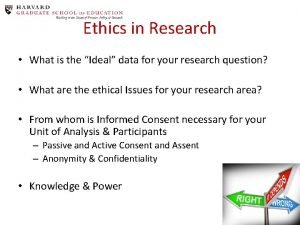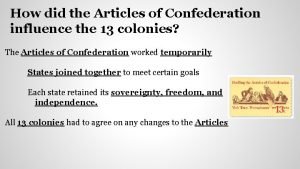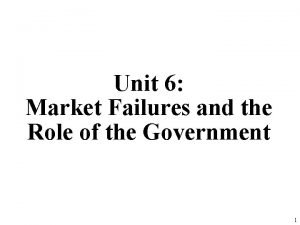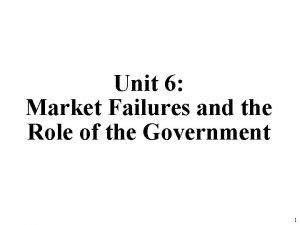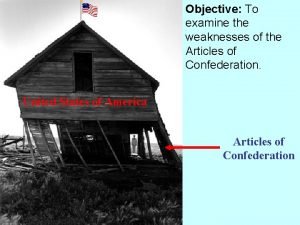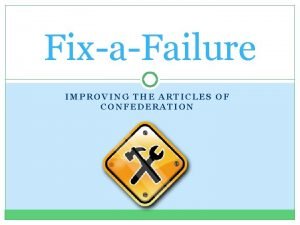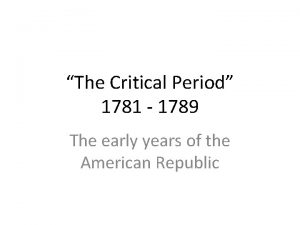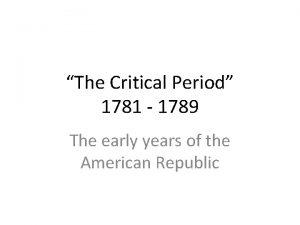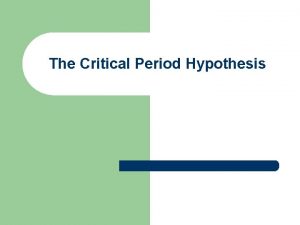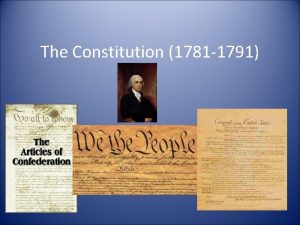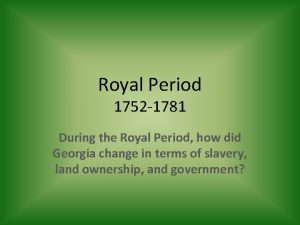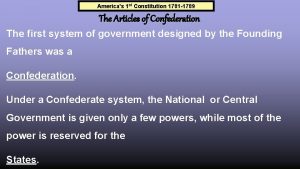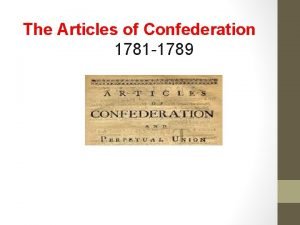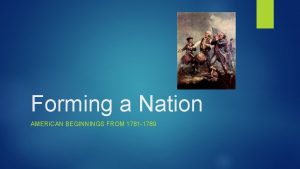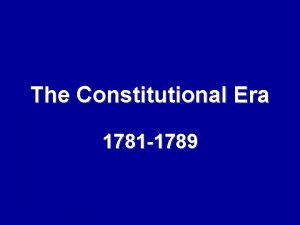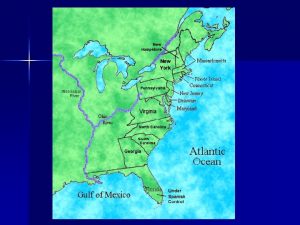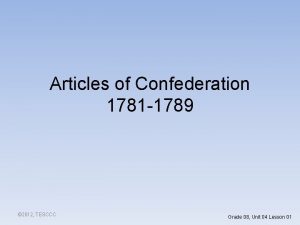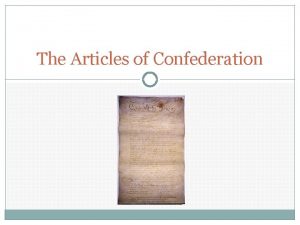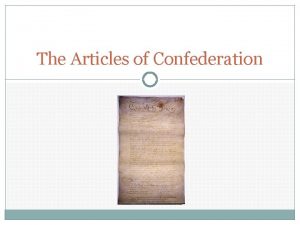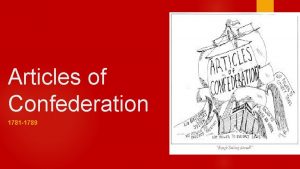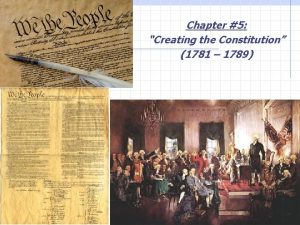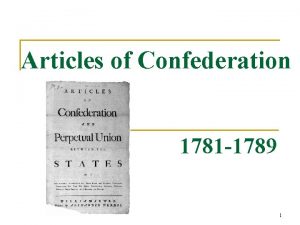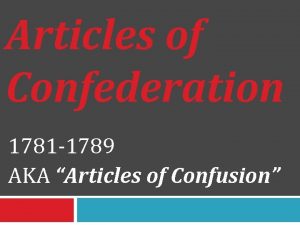The Critical Period 1781 1789 Failures of the





















- Slides: 21

The “Critical Period” 1781 - 1789 “Failures” of the Articles of Confederation

The “Critical Period” 1781 -1789 • Powers of central government: Weak and limited under Articles of Confederation • – Individual states retained majority of governmental power Numerous restraints built into articles to make any changes in it nearly impossible – Congressmen were appointed every year • Voted the way state legislatures told them to – Only a congress…no chief executive provided for – Each state only given one vote in Congress and 9 had to agree before a bill would pass • Meant that five smallest states could block any measure they didn’t like (majority tyranny) • Right’s of the minority state? • Attendance was so lax that 9 states were often not present so nothing got passed

Federalists argue for more federal power • • • Who were the Federalists (nationalists)? Hamilton Madison Morris Washington • “Need to afford to feed, clothe, support the troops…” – Stronger Central Government • What was their evidence?

Settlement of the West • Congress passed several laws that provided for efficient and regular settlement of the West – But British refused to cooperate • Treated U. S. ambassadors like dirt • Refused to appoint ambassador to the U. S. • Refused to evacuate forts in the West – Direct violation of the Treaty of Paris

What did the US do about it? ? ? Nothing. • British justified violation of Peace of Paris by stating that Americans also violated it: – By refusing to pay Loyalists for property they lost during the Revolution • Congress lacked power to raise an army to force British out of forts and could not levy taxes to pay off Loyalists: – West therefore remained closed to American settlement

1785 – Mount Vernon Conference: • Virginia and Maryland attended (at Washington’s home on the Potomac) • Regarding Foreign Ships on the Potomac: – Who would license the pilots? – Where would the ships land? – Which states would get tariff revenue? Maryland or Virginia?


Economic Problems • British now put heavy duties (taxes) on American imports to England – Congress did not have power to regulate trade so could not retaliate by doing same thing to British products coming into America – New markets not large enough to fill gap caused by loss of British market • Foreign merchants had governments that supported and protected them – American merchants were on their own and suffered as a result – A recession followed: – Foreign trade fell off dramatically and standard of living may have dropped by as much as 20%

Trade wars between the states • Mercantilism was still the prevailing economic theory of the day. • States were imposing tariffs against other states so that the people would buy their states’ goods. • This made trade between the states contentious and extremely difficult. • Federalists (Nationalists) argued that the central government needed to be able to “regulate” (keep regular) commerce between the states to prevent this.

Would a stronger Federal Government actually fix the tariff problem? • “It is therefore evident, that one national government would be able, at much less expense, to extend the duties on imports beyond comparison, further than would be practicable to the States separately, or to any partial confederacies. Hitherto, I believe, it may safely be asserted, that these duties have not upon an average exceeded in any State three per cent. In France they are estimated to be about fifteen per cent, and in Britain they exceed this proportion. There seems to be nothing to hinder their being increased in this country to at least treble (three times) their present amount. ” • Alexander Hamilton

Meeting to discuss the articles • 1786 – Annapolis Convention • Only 5 states showed up – Madison and Hamilton showed up. – Madison writes that: “We need to have a convention next summer in Philadelphia to amend the Articles. . . ”

And Washington’s favorite argument: “Pay for soldiers…” • The army had been promised pay…states didn’t comply • Washington thought there had to be a stronger government…but wanted to stay in Mt. Vernon and farm. • They begged Washington to go to the 1787 convention in Philadelphia…they NEEDED him. • “Have I not yet done enough for my country? ”

The road to rebellion? - During the revolution, States had been adopting laws that Federalists thought were unjust o Ex. – State laws “staying” foreclosures: (Stay Laws) Farmers would borrow money from banks before planting (pay for crops, help, land, etc. ) Would pay back banks after harvest and selling crops During war, British blockaded US farmers…we used to sell to Britain Farmers lost a lot of money…didn’t pay banks back

Banks foreclose Banks are not getting paid. Banks wanted their money back…foreclosed on farms States made laws stopping foreclosures for 6 months. Then was extended for years o Federalists flipped out…wanted these laws repealed. They argued: “These state policies could destroy the country: ” But the truth was: “What bank would ever lend money to farmers again? ” Hence, drying up the credit markets for the country.

The curse of inflation - These States passed laws authorizing the creation of “paper money” instead of “specie”. (To help stop foreclosures) o This led directly to inflation

Inflation, debt, and taxes - The state government in Massachusetts printed money…which created debt and inflation. - Massachusetts needed to pay back their debt: - So, at the end of revolution…they paid off state debt by raising taxes. - Farmers owed money back in debt for the farms AND property taxes to the state. - But they could only pay in “specie”…gold or silver…not paper dollars. - Remember, these states “printed” money so there was not much “specie” left.

Shay’s rebellion - Daniel Shays, a farmer and former Revolutionary War veteran, decided that when tax collectors showed up: - “We could beat them up…” o This worked for a while o Then they burned down a few local court houses: This way they could say that they paid their taxes…and the records are in the court house that just burned down.

What happened? - Federalists flipped out: o Sam Adams had no sympathy for Shays o Jefferson thought this wasn’t much of a big deal: o “It was only 1 rebellion” o “A little rebellion now and then is a good thing. ” o Ultimately the Massachusetts state govt. put down the rebellion o But this reinforced in James Madison’s mind that we had a crisis in America because we have no way to fund the government.

Summary • The government set up by the Articles of Confederation was thought to be ineffective in dealing with our most serious problems – It couldn’t open the West to free settlement – It couldn’t get the British to live up to their treaty obligations – It couldn’t protect the interests of American merchants – It couldn’t prevent trade wars b/t the states – It couldn’t prevent the outbreak and spread of social unrest within the states – It couldn’t fund the army…or tax • It was becoming increasingly clear that the Articles had to be at least dramatically revised if the United States was to survive

Remember… • The whole purpose of forming a central government was to secure the natural rights of the individual. • Was it doing its job? • If so, than leave it alone. • If not…then we needed to fix it.

Hence, the 1787 convention in Philadelphia
 Critical semi critical and non critical instruments
Critical semi critical and non critical instruments Spaulding classification of medical devices ppt
Spaulding classification of medical devices ppt Critical period
Critical period Approaches to child development
Approaches to child development Critical period vs sensitive period
Critical period vs sensitive period Critical period vs sensitive period
Critical period vs sensitive period Bolzano (1781 – 1848)
Bolzano (1781 – 1848) Uranus was discovered accidentally in 1781
Uranus was discovered accidentally in 1781 Attitude indicator errors
Attitude indicator errors Chapter 7 section 1 guided reading
Chapter 7 section 1 guided reading Example of pure competition
Example of pure competition Cloud security failures
Cloud security failures How did the articles of confederation fail
How did the articles of confederation fail Unit 6 four market failures
Unit 6 four market failures Unit 6 market failures and the role of the government
Unit 6 market failures and the role of the government Market failures
Market failures Failures of the articles of confederation
Failures of the articles of confederation Genghis khan
Genghis khan Issues with the articles of confederation
Issues with the articles of confederation Failures of classical physics
Failures of classical physics Define market failure
Define market failure Joseph stalin main accomplishments
Joseph stalin main accomplishments





